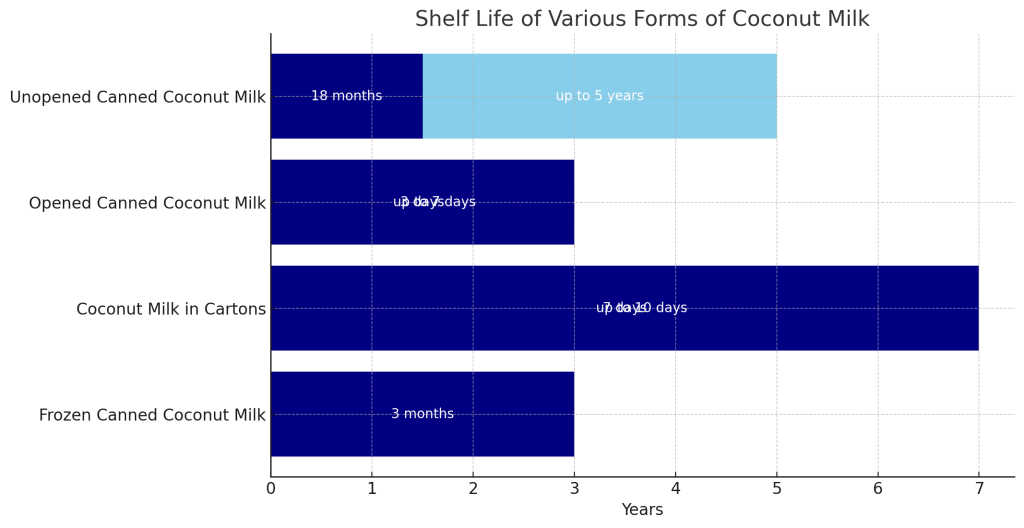Key Takeaways TABLE
| Aspect | Details |
|---|---|
| Shelf Life of Unopened Canned Coconut Milk | 18 months to 5 years, depending on storage conditions |
| Shelf Life of Opened Canned Coconut Milk | 3-7 days in the refrigerator, varies by brand |
| Freezing Canned Coconut Milk | Can be frozen for 3 months, safe indefinitely at 0°F |
| Shelf Life of Coconut Milk in Cartons | 7-10 days once opened and refrigerated |
| Signs of Spoilage | Changes in appearance, smell, and consistency |
How Long Does Canned Coconut Milk Last?
Canned coconut milk, a staple in many kitchens for its rich flavor and versatility, has varying shelf lives depending on whether it’s opened or unopened and how it’s stored.
Unopened Canned Coconut Milk
Unopened canned coconut milk typically lasts between 18 months to 5 years. This longevity is contingent on proper storage conditions, such as keeping the cans in a cool, dry place away from direct sunlight and heat sources. The exact duration can differ based on factors like the brand and manufacturing process.
- For more insights on the longevity of unopened coconut milk and storage tips, visit our article on how to tell if canned coconut milk is bad.
Opened Canned Coconut Milk
Once opened, the shelf life of canned coconut milk decreases significantly. Most brands will last between 3 to 7 days when stored in the refrigerator. This duration can vary slightly from one brand to another, so it’s essential to check the product’s expiration date and note any changes in smell or appearance, which could indicate spoilage.
- Discover detailed storage recommendations in our guide how to store canned coconut milk after opening.
Freezing Canned Coconut Milk
For extended shelf life, canned coconut milk can be frozen. Properly stored, it maintains its best quality for about 3 months but will remain safe beyond that time. When frozen at 0°F, coconut milk keeps safe indefinitely, though its quality may diminish over time.
Coconut Milk in Cartons
Coconut milk also comes in carton packaging. Once opened, these cartons of coconut milk should be refrigerated and typically last for 7 to 10 days. It’s crucial to store them correctly to maintain freshness and prevent spoilage.
Signs of Spoilage
It’s vital to recognize the signs of spoiled coconut milk, which include changes in color, consistency, and smell. If the coconut milk appears curdled, has an off smell, or the can shows signs of damage, it should be discarded.
- Learn more about identifying spoiled coconut milk and its implications in our detailed article why is my canned coconut milk solid.
Culinary Uses and Enhancements
Canned coconut milk is a versatile ingredient used in various recipes, from savory dishes to desserts. Its rich, creamy texture enhances the flavor profile of many cuisines. For creative culinary uses and to enhance its flavor, explore our guide on how to make canned coconut pecan frosting better.
Comparison with Coconut Milk in Cartons
It’s also helpful to understand the difference between canned coconut milk and the variety available in cartons. While canned coconut milk is thicker and more suitable for cooking, coconut milk in cartons is often lighter and used as a dairy milk substitute in beverages and cereals.
- For a comprehensive comparison, check out our article what is the difference between canned coconut milk and coconut milk in a carton.

Best Practices for Storing Canned Coconut Milk
To maximize the shelf life of canned coconut milk, it’s essential to adhere to proper storage practices. Here are some useful tips:
Before Opening
- Cool and Dry Storage: Store unopened cans in a cool, dry place away from heat and light sources.
- Avoid Temperature Fluctuations: Consistent temperatures help preserve the quality of the milk.
After Opening
- Refrigeration: Once opened, transfer the coconut milk to an airtight container and refrigerate.
- Prevent Contamination: Use clean utensils to avoid introducing bacteria.
Freezing Coconut Milk
- Freeze in Portions: Freeze in ice cube trays for easy portion control.
- Thawing: Thaw in the refrigerator or use directly in cooking.
Nutritional Benefits of Coconut Milk
Canned coconut milk is not only flavorful but also nutritious. It’s rich in vitamins and minerals, and provides a good source of medium-chain triglycerides (MCTs), known for their energy-boosting properties. However, it’s also high in calories and saturated fat, so moderation is key.
Health Considerations
- Allergies and Dietary Restrictions: Ideal for those with lactose intolerance or dairy allergies.
- Heart Health: Contains lauric acid, which may support heart health.
Creative Culinary Applications
Canned coconut milk is incredibly versatile in the kitchen. Here are some creative ways to use it:
- Soups and Curries: Adds creaminess to dishes without dairy.
- Desserts: Perfect for vegan and dairy-free desserts.
- Smoothies: Enhances the richness of fruit smoothies.
Environmental and Ethical Aspects
When purchasing canned coconut milk, consider the environmental and ethical implications. Look for brands that practice sustainable farming and fair trade policies to ensure you’re making a responsible choice.
- Explore more about the ethical considerations in our detailed article on what is the difference between canned coconut milk and coconut milk in a carton.
Frequently Asked Questions About Canned Coconut Milk
Can You Use Canned Coconut Milk Past Its Expiration Date?
While canned coconut milk can last a long time, it’s advisable to adhere to the expiration date for safety. If the can is not damaged and the milk looks and smells normal, it might still be usable shortly after the expiration date, but always exercise caution.
How to Tell if Canned Coconut Milk Has Gone Bad?
Signs of spoilage include an off smell, discoloration, and a lumpy or curdled texture. If the can is bulging, leaking, or rusted, discard the milk immediately.
Is Canned Coconut Milk Healthier than Fresh Coconut Milk?
Canned coconut milk is often more concentrated and higher in calories and fat compared to fresh coconut milk. However, it’s a convenient and long-lasting alternative that retains most of the nutritional benefits of fresh coconut milk.
Can You Freeze Coconut Milk in the Can?
It’s not recommended to freeze coconut milk in the can. Instead, transfer it to a freezer-safe container or ice cube tray for freezing.
Conclusion
Canned coconut milk is a valuable addition to any pantry, offering versatility, flavor, and nutritional benefits. By understanding its shelf life, storage practices, and culinary applications, you can make the most out of this tropical ingredient.
For more insights and tips on coconut milk and other coconut products, visit CoconutSphere.com, your comprehensive guide to everything coconut.

